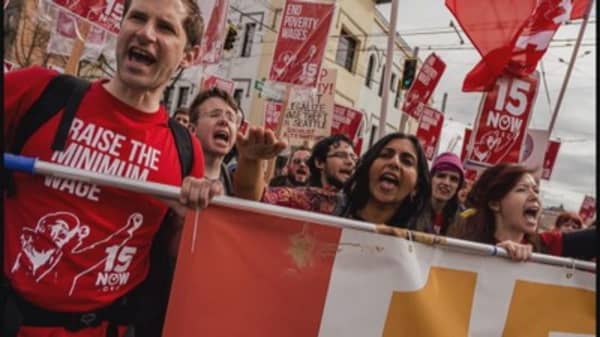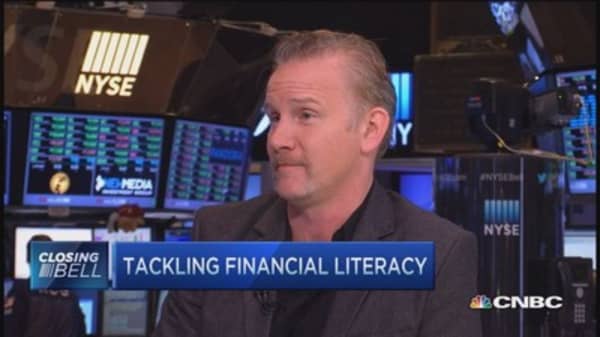As a filmmaker, you might say I was a late bloomer. Up until age 30, I held a series of minimum wage jobs while I sorting out what I wanted to be in life.
Those jobs included, among others, a warehouseman for a tire distributor, city painter, order picker for a vitamin mail-order company, chain-bookstore clerk, and short-order cook at a burger joint. Back when I was doing these jobs, it was possible to eke out a living, especially at the restaurant where I got meals for half price. The more profound costs were to my pride: What was I doing with my life and how could I avoid the second question at parties after "What's your name?" That being, "And what do you do for a living?"
Read MoreSay what? A minimum-wage hike finds hope in the heartland
Not everyone working in minimum wage is embarrassed by the work. But many these days are embarrassed that they can't make ends meet — even with full-time jobs. Because so much of our self-worth as Americans is wrapped up in our work and ability to pull our own weight, it's particularly tough to be a minimum-wage worker these days. Looking up from the bottom of the workforce, it seems the harder one works, the less one gets paid. American society is rigged for the wealthier among us — tax breaks on our mortgage, company-provided health care, paid vacations, and regular raises or incentives.
For so many of us who once worked minimum-wage jobs, this phase of our life was temporary. We knew we'd move on to more prosperous careers. When looking at the minimum-wage debate today, too many of us think that workers want security from jobs that were designed to be stepping-stones to "real jobs." So the "Fight for 15" and related initiatives strike us as excessive and ultimately self-defeating: Increased wages reduces jobs and increases prices to the point where minimum wagers will find themselves in the same predicament again.
Read MoreWhy we should raise the minimum wage
Well, not exactly. Most economic studies going back to Alan Krueger and David Card's seminal 1993 study overwhelmingly prove that employment is not meaningfully affected by increased wages. And yes, from doing "The Value of Work," a documentary on minimum wage, I do believe that businesses, especially smaller ones, will have to charge more for their goods and services. But given the competitiveness of free-market economies, and a gradual phasing in of wage increases, doubling the minimum wage from $7.75 to $15/hour will not double the cost of living. And the benefits will be for workers and businesses. As Seattle Mayor Ed Murray says in our film: Increased wages make it possible for more people to spend hard earned cash on more than the bare necessities.
A conservative economist I spoke to pointed out that minimum-wage workers have this wonderful tax break called the "earned income tax credit" to help offset the gap between what they make and the cost of living. True, but our research showed that as many as half of qualified workers don't avail themselves of the tax credit. And that, among those who do, there is a substantial amount of tax fraud — people who "qualify" by underreporting income. I think more workers should be made aware of this provision. I'm no economist, but some I spoke with said the ultimate solution is NOT giving people tax breaks. With the spiraling national debt, we want more people paying more taxes, not less — which will make our country more fiscally sound, as well as more prosperous and equitable.
Read More The real problem with raising the minimum wage: CEO
I was struck in so many ways by the minimum-wage workers we interviewed for the film. I was amazed at their work ethic despite low wages. (I've found that people either work hard or they don't, which has more to do with who they are than what they get paid.) I was saddened by the stories of older workers like Ernie and William who never thought they'd be cleaning houses and hauling furniture at their age, struggling to get by. And I was moved by the resiliency of workers like Elizabeth and Keila who still dare to dream of a better life for themselves and their children.
I think we owe them the opportunity to try to make those dreams happen. Not a free ride, but a real fighting chance.
Commentary by Steve James, the director of "The Value of Work," a documentary on minimum wage that is part of Morgan Spurlock's "We The Economy" series. James has directed award-winning documentaries, including "Hoop Dreams," "Stevie" and "The Interrupters." His latest, "Life Itself," is a biography of the late critic Roger Ebert.
Watch filmmaker Morgan Spurlock discuss his new film series, 'We The Economy'





